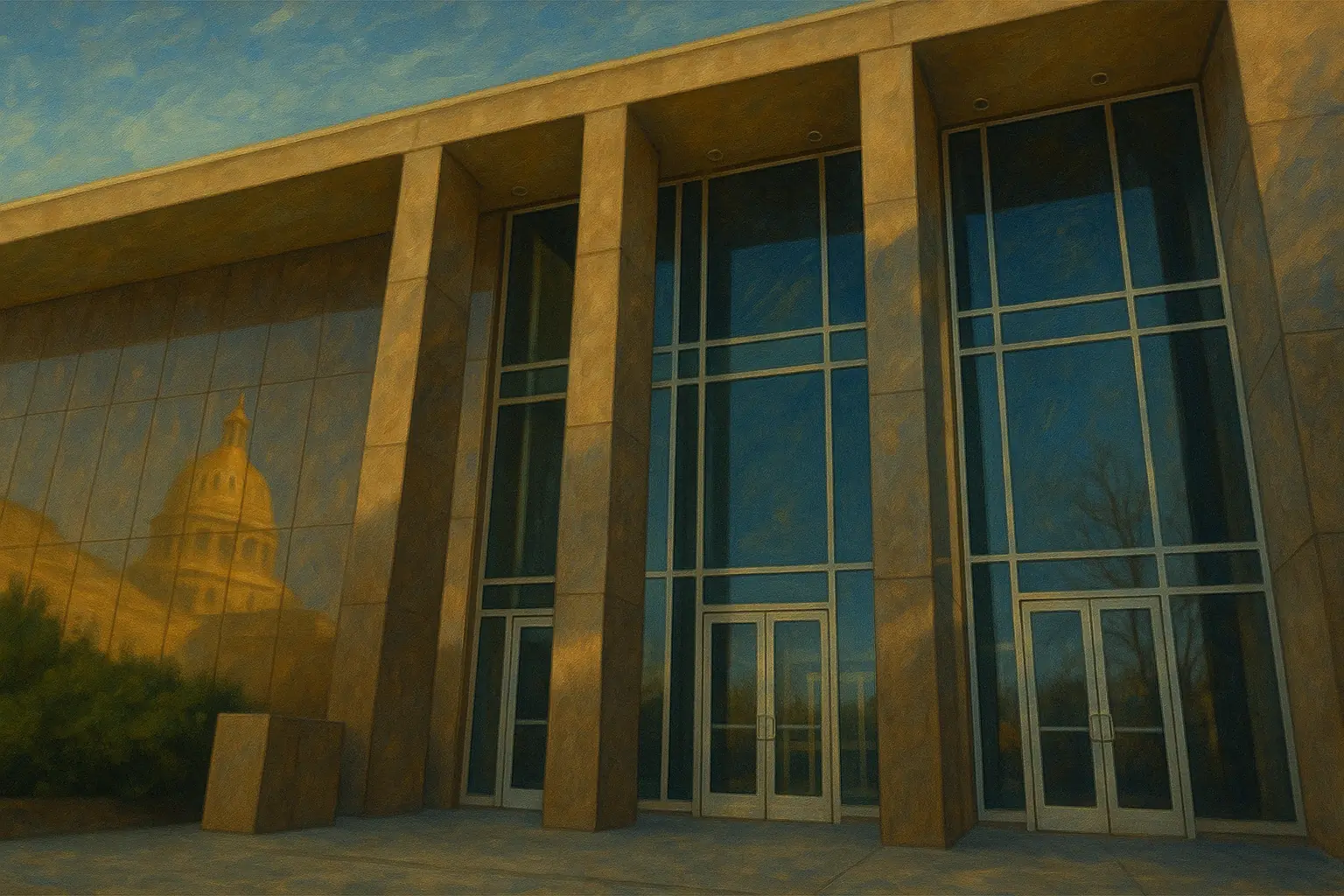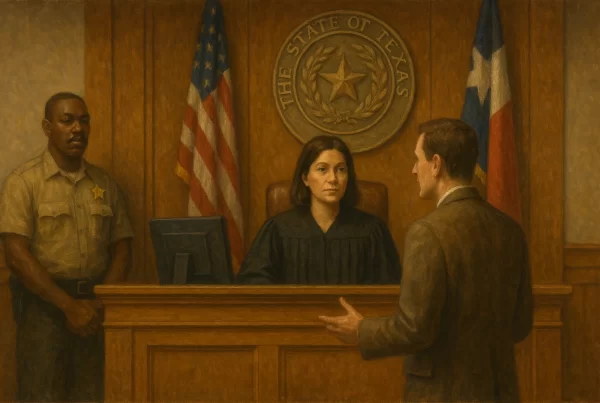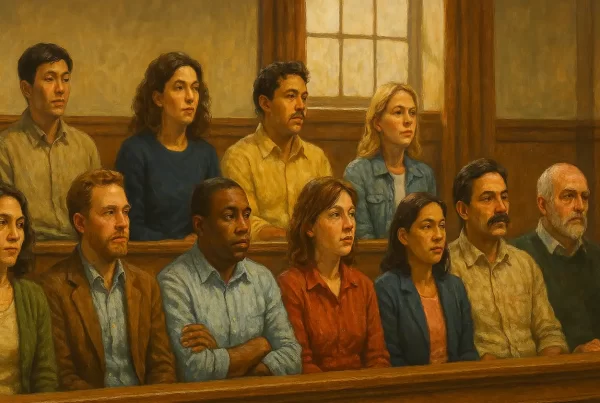The Supreme Court of Texas is the highest civil appeals court in the State of Texas. It consists of eight justices and a chief justice. As the final authority on civil law in the state (though not criminal law), the Supreme Court plays a central role in shaping Texas jurisprudence. Its rulings carry statewide implications, often setting legal precedent on issues ranging from property disputes and contractual interpretation to constitutional rights under Texas law.
The court not only decides individual appeals but also sets the procedural rules that govern how civil cases are tried and appealed throughout the state. This includes rules of civil procedure, rules of appellate procedure, rules of evidence, and other courtroom standards used by judges and attorneys statewide. The court also oversees the State Bar of Texas1 and appoints members to the Board of Law Examiners,2 giving it substantial influence over the legal profession.
The Texas Supreme Court normally meets in Austin, but the state constitution allows it to “sit at any time during the year… at the court’s discretion, at any other location in this state for the transaction of business.”3 Occasionally, the court does hold oral arguments in other cities.
“Sicut Patribus, Sit Deus Nobis.”
Texas Supreme Court motto, which means, ‘May God be with us, as he was with our fathers.’
Jurisdiction
The Supreme Court of Texas has final appellate jurisdiction over all civil and juvenile cases arising under state law.4 Most cases reach the court through petitions for review from the 15 intermediate Courts of Appeals. The Texas Supreme Court does not hear criminal cases. Final appellate authority in criminal matters instead rests with the Texas Court of Criminal Appeals.
The only exception is juvenile delinquency cases, which are classified as civil proceedings under the Texas Family Code.5 This division of authority reflects Texas’s unique bifurcated appellate system. Texas is one of only two states in the United States where civil and criminal appeals are handled by separate high courts.
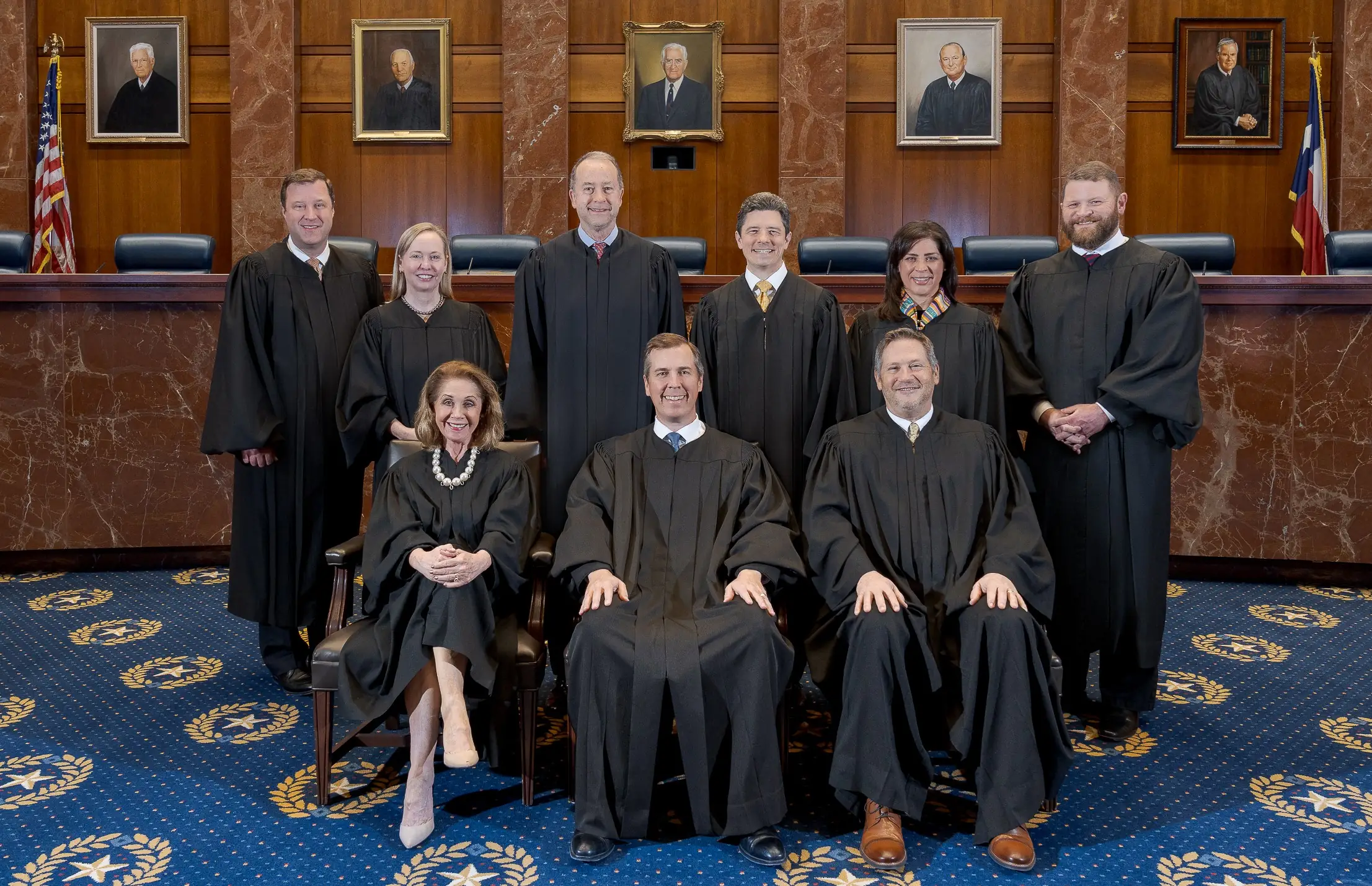
Elections and Term of Office
Texas Supreme Court justices are elected in partisan statewide elections, unless appointed to fill a vacancy. They serve staggered six-year terms, with three justices up for election every two years.6
When a vacancy arises on the court, the governor may appoint a justice to serve the remainder of the unexpired term, subject to confirmation by the Texas Senate. In practice, many justices retire before the end of their final term, allowing the governor to appoint a successor who then runs for reelection as an incumbent.
In effect, this means that the Texas system of judicial selection is a hybrid between an appointive system and an elective one.
Qualifications of Justices
According to Article 5, Section 2 of the Texas Constitution, justices must be:
- at least 35 years old
- a citizen of the United States
- a resident of Texas
- licensed to practice law in Texas
- have practiced law for at least ten years, or have been a judge for at least ten years.
Current Justices
The current justices of the court are:
Place 1: Jimmy Blacklock (chief justice)
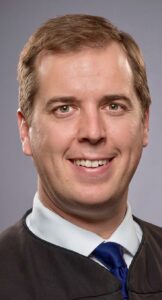
Chief Justice Jimmy Blacklock was first appointed to the Supreme Court of Texas in January 2018 by Governor Greg Abbott. Justice Blacklock was elected by the public following his appointment and re-elected in 2024. Governor Abbott then appointed him to serve as the Court’s 28th Chief Justice in January 2025.
Before joining the Court, Justice Blacklock served as Governor Abbott’s General Counsel and in the Attorney General’s Office under then-AG Abbott. While at the AG’s Office, he handled appeals and trials of constitutional cases in state and federal court involving matters such as federalism, religious liberty, and the separation of powers.
As Deputy Attorney General for Legal Counsel, he oversaw the Open Records and Opinions divisions of the AG’s Office. Earlier in his career, Justice Blacklock was appointed by President George W. Bush to serve in the Civil Rights Division of the U.S. Department of Justice, and he worked in private practice in Houston and Austin. He clerked for Judge Jerry Smith on the U.S. Court of Appeals for the Fifth Circuit after graduating with a bachelor’s degree from the University of Texas and a J.D. from Yale Law School. Justice Blacklock was born in Houston and now lives in Austin with his wife and three daughters.
Place 2: James P. Sullivan
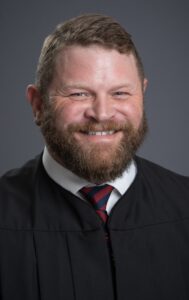
Justice James P. Sullivan was appointed to the Supreme Court of Texas by Governor Greg Abbott in January 2025.
Before joining the Court, Justice Sullivan served as General Counsel to Governor Abbott and as Assistant Solicitor General under then-Attorney General Abbott. He also worked as an appellate litigator in private practice and as an adjunct professor at George Mason University.
Justice Sullivan was a law clerk to Judge Thomas B. Griffith on the U.S. Court of Appeals for the D.C. Circuit. He received his Bachelor of Arts degree from Rice University and his Juris Doctor from Harvard Law School, where he was an Articles Editor on the Harvard Law Review. Justice Sullivan lives in Austin with his wife, Alithea, and their son.
Place 3: Debra Lehrmann

Justice Debra Lehrmann is the Senior Justice on the Supreme Court of Texas and the Court’s longest-serving woman Justice in Texas history. With a total of almost 35 years of judicial experience, she was a trial judge in Tarrant County for 23 years prior to her appellate service and has served the Bar in leadership capacities on both a state and national level.
She served as the inaugural chair of the State Bar of Texas Child Protection Law Section and is a prior chair of the Family Law Section of the ABA. She is a commissioner on the Uniform Law Commission, a member of the American Law Institute, a fellow of the Texas Bar Foundation and the American Bar Foundation, a charter member of the Tarrant County Bar Foundation, an emeritus member and past president of the Lloyd Lochridge Inn of Court in Austin, and an emeritus member of the Eldon B. Mahon Inn of Court in Fort Worth.
Justice Lehrmann speaks frequently at continuing legal education events on a broad variety of topics throughout the state and country. She has received numerous awards and recognitions, including the University of Houston Law Center’s Sondock Jurist-in-Residence, the Texas Women Lawyers Pathfinder Award; the Child Protection Law Section Founder’s Award; the Court-Appointed Special Advocates Scott Moore Award in recognition for her service to children who are the subjects of abuse and neglect proceedings; the Texas Bar Foundation’s recognition for Best Law Review Article; and the Judge Eva Barnes Award for dedication and outstanding service to the legal profession.
A member of Phi Beta Kappa, Justice Lehrmann received her undergraduate degree with high honors from The University of Texas, her law degree from UT School of Law, and her LL.M. from Duke University. She and her husband have two sons, both practicing lawyers; a daughter-in-law; and two grandchildren.
Justice Lehrmann was most recently re-elected to her position in November 2022 to a term that expires December 31, 2028.
Place 4: John Devine
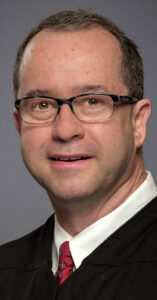
Justice John Devine was first elected to the Supreme Court of Texas in November 2012. He previously served for seven years as judge of the 190th State District Court in Harris County and for nine years as an appointed special judge for the Harris County justice of the peace courts.
A native of Indiana, Justice Devine attended Ball State University, graduating in 1980 with a B.S. degree in business administration and marketing. Following graduation, Justice Devine became a Texan and entered the corporate world of Shell Oil Co. in Houston as an analyst and later worked in various corporate and project-oriented positions. While at Shell, he was accepted by South Texas College of Law, graduating with a juris doctorate in 1986. Justice Devine remained with Shell until 1987. The next year Devine went to work for Brown & Root Inc., and again contributed to numerous corporate as well as major international and domestic industrial construction projects.
Justice Devine was elected in 1995 and re-elected in 1998 to the district court. During his tenure, he tried nearly 350 jury trials and presided over more than 500 bench trials. In 1998, he was voted well qualified by the Houston Bar Association. Justice Devine reduced his court’s case backlog by more than 40 percent during his two terms. He was awarded the title of “Texas Size Hero” by Focus on the Family magazine.
In his private litigation practice since 2002, Justice Devine represented both plaintiffs and defendants in state and federal courts. In 2002, he was appointed as a special judge for the Harris County justice courts and served until 2011. Devine was also a member of the District of Columbia Bar Association, the Board of Civil District Judge Mass Torts Committee, Board of Civil District Judges, the Harris County Juvenile Justice Charter School Board and the Harris County Juvenile Board.
Justice Devine has been married since 1989 to Nubia Piedad Gomez, formerly of Venezuela, and the couple has six children.
Justice Devine was re-elected in 2024 to a term that expires December 31, 2031.
Place 5: Rebeca Aizpuru Huddle
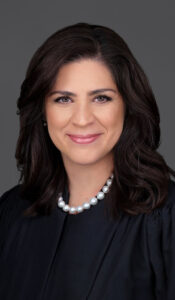
Justice Rebeca Aizpuru Huddle was appointed to the Supreme Court of Texas by Governor Greg Abbott in October 2020 and elected to a full term in 2022. She is a native of El Paso, where she grew up and attended Stephen F. Austin High School. Justice Huddle earned her undergraduate degree in political science at Stanford University and taught Spanish for a year before returning to Texas to attend law school. She earned her law degree at the University of Texas School of Law, where she was the recipient of three endowed presidential scholarships and graduated with honors.
Before entering public service, Justice Huddle practiced law at Baker Botts L.L.P., where she handled litigation matters ranging from individual personal injury cases to complex commercial and shareholder disputes and appeals. She was admitted to the firm’s partnership in 2008. In 2011, Justice Huddle was appointed by then Governor Rick Perry to serve as a justice on the Court of Appeals for the First District of Texas. She was then elected to that office in 2012. During her tenure at the First Court of Appeals, Justice Huddle authored more than 400 reasoned majority opinions and worked with her colleagues to dispose of many hundreds more appeals. Justice Huddle returned to Baker Botts as a partner in 2017, resuming her practice in commercial litigation and appeals. She served as the Partner-in-Charge of the firm’s Houston office beginning in 2018.
Justice Huddle has long been engaged in the community, in bar activities, and in mentoring younger lawyers. She is a member of the American Law Institute, a Fellow of the Texas Bar Foundation, and a Fellow of the Houston Bar Foundation. While in private practice, she served as a member of Texas’s Judicial Compensation Commission. In 2018, she received the Houston Bar Association Appellate Section’s award for Outstanding Judicial Service and Leadership. She was named a Woman on the Move by Texas Executive Women in 2019. She has served as a member of the board of directors of the Greater Houston Partnership, the Houston Area Women’s Center, and the Kinkaid School Investments Foundation.
Justice Huddle and her husband, Greg, have two teenage daughters.
Her current term expires on December 31, 2028.
Place 6: Jane Bland
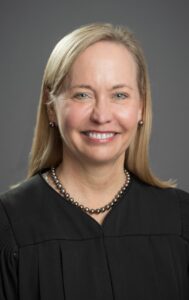
Jane Bland has served in the state judiciary for 25 years and on the Supreme Court of Texas since 2019. Before her service on the Court, she served 15 years as a justice on the First Court of Appeals and six years as a State District Judge.
Justice Bland chairs the Judicial Commission on Mental Health. She is also the Court’s liaison to the Texas Board of Legal Specialization and the Texas Supreme Court Historical Society. She is the deputy liaison to the Court’s Rules Advisory Committee. She is a member of the American Law Institute and serves on the Advisory Committee for the Federal Civil Rules for the Judicial Conference of the United States.
Throughout her career, Justice Bland has been recognized for her work to improve our state’s judiciary. In 2010, Chief Justice John Roberts presented her with the William H. Rehnquist Award, given to a state court judge who exemplifies the highest level of judicial excellence, integrity, fairness, and professional ethics. The Texas Association of Civil Trial and Appellate Specialists has recognized her as the judge of the year four times. She has received several President’s Awards for her work with the Houston Bar Association and the Houston Young Lawyers Association. Justice Bland is board-certified in civil appellate law and civil trial law.
She earned her undergraduate and law degrees from the University of Texas at Austin. Following law school, Justice Bland clerked for the Honorable Thomas Gibbs Gee on the United States Court of Appeals for the Fifth Circuit. She began her practice at Baker Botts LLP. Before her appointment to the Court, she was a partner at Vinson & Elkins LLP in Houston.
Justice Bland has chaired the board of Houston Volunteer Lawyers and the Oversight Committee for the Texas Pattern Jury Charges. She served on the Court’s Commission to Expand Civil Legal Services and the Board of Legal Specialization’s Civil Appellate Law Advisory Commission. She is a senior trustee of the UT Law School Foundation.
Justice Bland was re-elected to the bench in 2024 to a term that expires December 31, 2031. She and her husband, Doug, have two grown children.
Place 7: Jeff Boyd
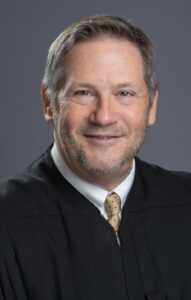
Jeff Boyd joined the Court on December 3, 2012, appointed by Governor Rick Perry to fill Justice Dale Wainwright’s unexpired term. Wainwright resigned September 30th. Justice Boyd was the governor’s chief of staff since September 2011. Before that he was Gov. Perry’s general counsel.
Boyd is a graduate of Abilene Christian University and earned his law degree summa cum laude from Pepperdine University, where he graduated second in his law school class. After graduation he clerked for Judge Thomas M. Reavley on the Fifth Circuit U.S. Court of Appeals.
He spent 15 years with Thompson & Knight L.L.P. in two stints, leaving first in 2000 to join then-Texas Attorney General John Cornyn as deputy attorney general for general litigation and continuing with Attorney General Greg Abbott. He rejoined Thompson & Knight as senior partner in 2003.
In January 2011 he left Thompson & Knight to join the Governor’s Office as general counsel.
Justice Boyd was named a Texas Super Lawyer for government practice in 2004 and in 2006-2010. He has been a Supreme Court Advisory Committee member since 2003.
He has served as board president and director of Volunteer Legal Services of Central Texas, as chair and director of Goodwill Industries of Central Texas and as a director of the Freedom of Information Foundation of Texas. He is serving a one-year term as president of the American Inns of Court, Robert W. Calvert Inn.
Before he went to law school, Boyd worked as youth and family minister of the Brentwood Oaks Church of Christ in Austin and was on the Brentwood Christian School board from 1994 to 2000.
He and his wife, Jackie, have twin daughters, a son, and one grandson.
Justice Boyd was re-elected in November 2020 to a term that ends December 31, 2026.
Place 8: Brett Busby
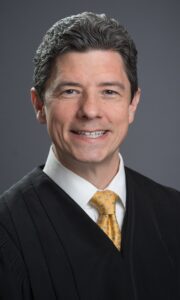
Brett Busby was appointed to the Court by Governor Greg Abbott in February 2019, confirmed unanimously by the Texas Senate, and elected to a full term in November 2020. An experienced appellate litigator, Justice Busby was a partner at the Bracewell firm in Houston and served on the Fourteenth Court of Appeals for six years before joining the Supreme Court.
Justice Busby is a seventh-generation Texan, third-generation Eagle Scout, and life-long violinist who grew up in Amarillo and Austin. After graduating with high honors from Duke University and Columbia Law School, he served as a law clerk to Justices Byron R. White (Ret.) and John Paul Stevens, U.S. Supreme Court, and to Judge Gerald Bard Tjoflat, U.S. Court of Appeals, Eleventh Circuit.
In private practice, Busby represented plaintiffs and defendants in a wide variety of appeals before the U.S. Supreme Court, Supreme Court of Texas, and federal and state appellate courts. Super Lawyers Magazine named him one of the top 100 lawyers in Texas in 2012, and Chambers and Partners recognized him as a leading Texas appellate lawyer. He is Board Certified in Civil Appellate Law and is a former adjunct professor at the University of Texas Law School, where he helped teach the U.S. Supreme Court Litigation Clinic.
In 2018, the Texas Association of Civil Trial and Appellate Specialists recognized Justice Busby’s judicial service by naming him Appellate Judge of the Year. He has also received the Judge of the Year Award from the Hispanic Bar Association of Houston and the Outstanding Mentor Award from the Houston Young Lawyers Association. Attorneys consistently rate Justice Busby highly in judicial evaluation polls.
Justice Busby is dedicated to improving the justice system and the legal profession. His fellow Texas appellate lawyers recently elected him as Chair of the State Bar of Texas Appellate Section. He works closely with the Texas Access to Justice Commission, which helps assure that Texans with limited means have access to basic civil legal services. He previously served on the Texas Multi-District Litigation Panel and chaired the State Bar Committee on Pattern Jury Charges (Business, Consumer, Insurance, and Employment). Busby is also active in his community: he is a Senior Fellow of the American Leadership Forum and has served on the boards of the Post Oak School and the Houston Symphony (where he chaired the Artistic Affairs Committee and the Music Director Selection Committee).
Justice Busby and his wife, Erin, met as law clerks at the U.S. Supreme Court. They have two children.
His current term ends December 31, 2026.
Place 9: Evan A. Young
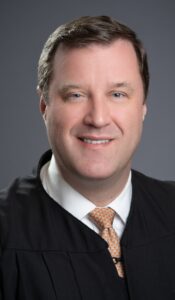
Justice Evan A. Young was appointed to the Supreme Court of Texas in November 2021 by Governor Greg Abbott. Justice Young subsequently was elected in November 2022 to a term that expires December 31, 2028.
Justice Young clerked for U.S. Supreme Court Justice Antonin Scalia and served as Counsel to the Attorney General at the U.S. Department of Justice, during which time he spent nearly a year based at the U.S. Embassy in Baghdad, Iraq, helping lead the U.S. Government’s Rule of Law mission.
He joined the law firm Baker Botts L.L.P. and served as chair of the firm’s Supreme Court and Constitutional Law practice group. Justice Young, who served as a member of the Texas Judicial Council from 2017 until his appointment to the Supreme Court, is a former chair of the National Center for Missing and Exploited Children Texas Regional Office, a member of the Supreme Court Advisory Committee, an elected member of the American Law Institute, and an adjunct professor at The University of Texas School of Law.
Justice Young received Bachelor of Arts degrees from Duke University and from Oxford University, where he was a British Marshall Scholar, and his law degree from Yale Law School. He is a graduate of Tom C. Clark High School in San Antonio and now resides in Austin with his wife, Tobi, and their daughter.
All current members of the Texas Supreme Court are Republicans.
Staff and Organization Chart
The staff of the Supreme Court are organized into nine chambers, each serving one justice, plus an administrative staff and clerk’s office that serve the court as a whole.
Each chambers staff consists of an executive assistant, a permanent staff attorney, and two law clerks, who are usually recent law school graduates and serve a one-year term.
The staff attorneys and law clerks assist the justice with legal research, opinion drafting, cite checking, and analysis of the hundreds of petitions for review the court receives each year.
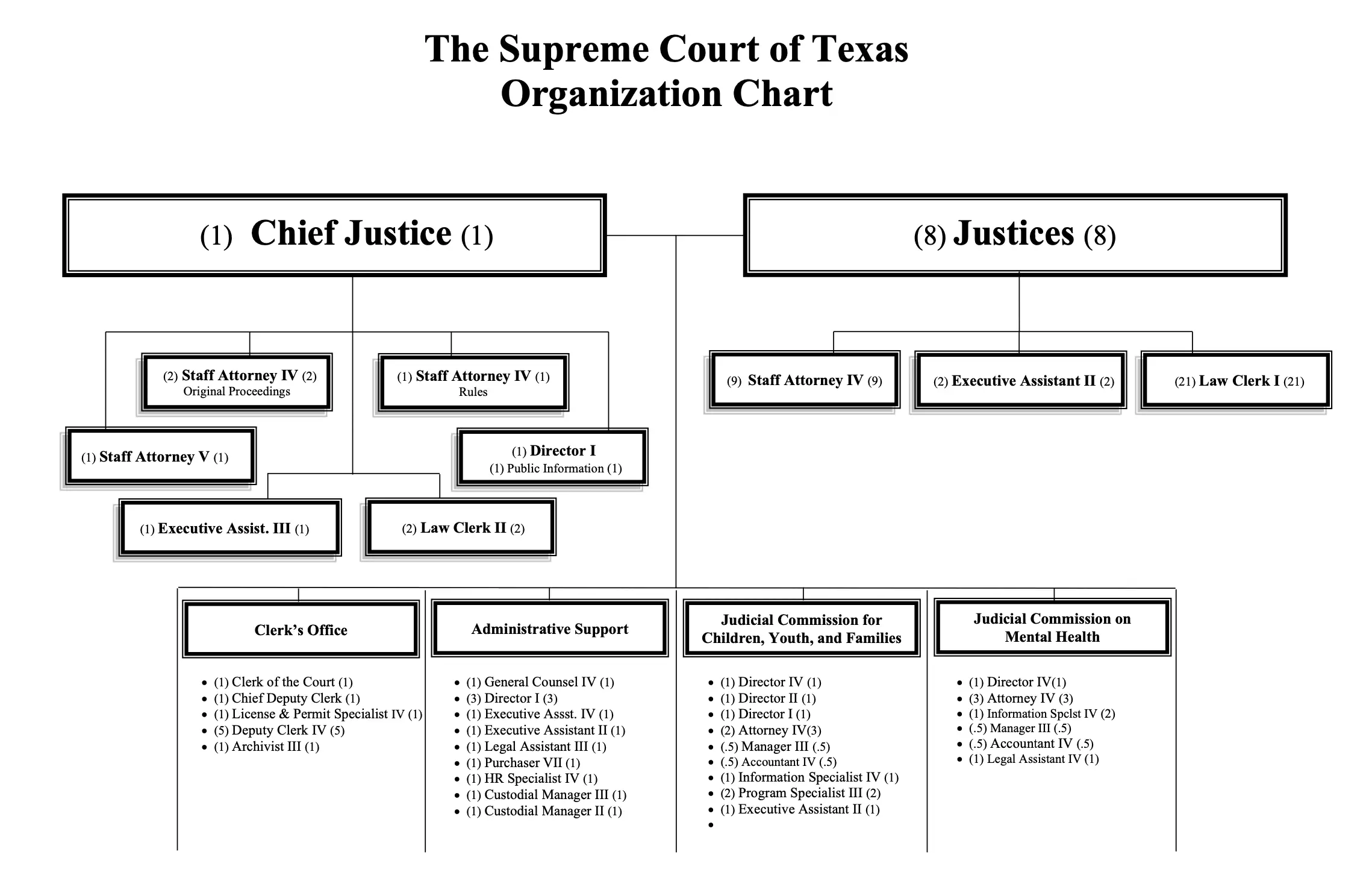
Administratively, the court is overseen by a chief clerk, who is appointed by the justices and serves a four-year term. Assisted by several deputies, the chief clerk receives and processes electronic filings and interfaces with the public.
Finally, the Supreme Court also employs more than a dozen staff in support of two permanent commissions, the Judicial Commission for Children, Youth and Families, and the Texas Judicial Commission on Mental Health.
In total, the court employs approximately 85 staff members, including the nine justices.
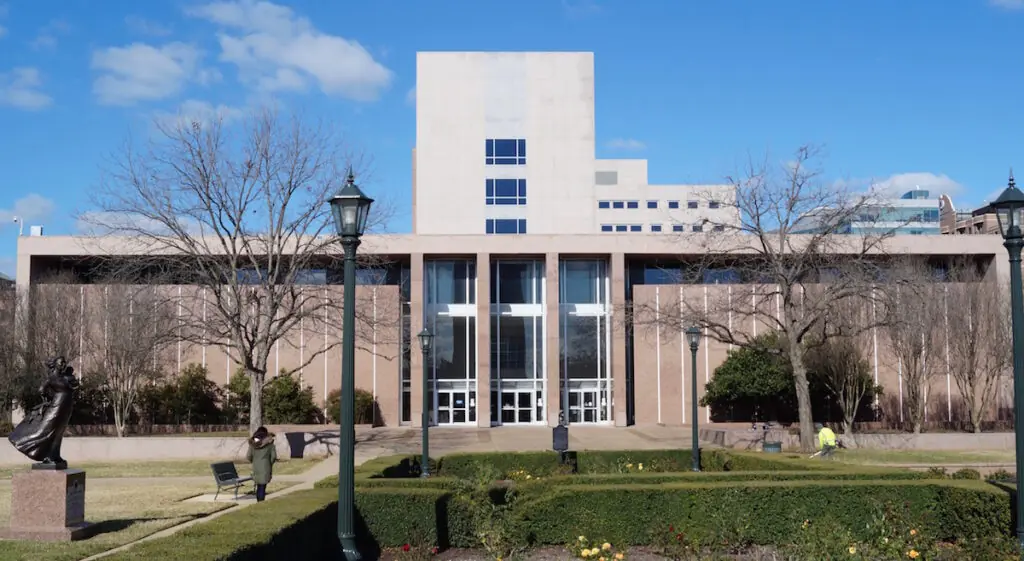
Judicial Process and Case Flow
Case Files and Video of Oral Arguments
The Supreme Court publishes all relevant case documents on its website, accessible to the public, as well as all of its orders and opinions.
Videos of oral arguments are available online through a partnership with the State Bar. Internal deliberations of the court, such as the regular “conference” meeting, are confidential.
